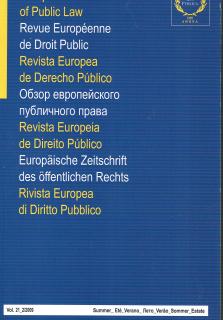
Jurisprudence
Constitutional / Constitutionnelle
2007
France
Professeurs à l’Université Paris I Panthéon-Sorbonne, Directeurs du Centre de recherche de droit constitutionnel (CRDC)
A new legislature started during the year 2007, as an expression of the various reforms required by the President of the Republic. During this year, the Council has exhaustively dealt with case law in criminal matters. On the one hand, with regard to the rules applicable to minors, the mitigation of responsibility is not automatic, in particular in case of repeat offending (dec. 554 DC). In addition, the necessity of seeking educational and moral rehabilitation does not imply that the repressive measures should always be rejected (dec. 553 DC). On the other hand, the respective scope of the principles of necessity and of tailoring of punishments was specified (dec. 554 DC). Moreover, the Council controlled the conditions for the exercise of the right to strike by setting out the individual nature and the collective exercise of this right. Therefore, the outbreak of the strike can be entrusted to trade unions, and the employees can be consulted regarding its continuation (dec. 556 DC). The Council has also been repeatedly confronted with the principle of equality. The principle of equality in fiscal matters has been the subject of an unusually thorough control (dec. 555 DC). The general principle of equality, newly based on Article 1 of the Declaration of the Rights of Man and of the Citizen, has itself been directly used in order to highlight the additional means for proving filiation within the framework of family reunification (dec. 557 DC). Finally, the procedural censure concerning the ethnic statistics was accompanied by an assessment on the merits relating to the prohibited discriminations. With regard to Article 1 of the Constitution, the Council has thus set a limit for the future to the legislator (dec. 557 DC). The Council has also pursued the control of the conditions for the exercise of the right of amendment according to the progress of the proceedings, at a first (dec. 549 DC and dec. 557 DC) and at a second reading (dec. 553 DC). This determination in fighting against abuses in the exercise of this right has led it to act on its own motion on the issue (dec. 553 DC) and to apply strictly its case law as far as “cavaliers sociaux” are concerned (dec. 558 DC). Finally, basing its decision on another judgment already given, the Council was committed to a recognition of the authority deriving from the interpretative precedent (dec. 560 DC).
Une nouvelle législature a commencé au cours de l’année 2007, traduisant les diverses réformes voulues par le Président de la République. Durant cette année le Conseil a approfondi sa jurisprudence en matière pénale. D’une part, s’agissant des règles applicables aux mineurs, l’atténuation de la responsabilité n’est pas automatique, notamment en cas de récidive (déc. 554 DC). De même la nécessité de rechercher le relèvement éducatif et moral n’implique pas que les mesures répressives doivent toujours être écartées (déc. 553 DC). D’autre part, la portée respective des principes de nécessité et d’individualisation des peines a été précisée (déc. 554 DC). De plus, le Conseil a encadré les conditions d’exercice du droit de grève en articulant la nature individuelle de ce droit et son exercice collectif. Ainsi, le déclenchement de la grève peut être confié à des syndicats et les salariés peuvent être consultés sur sa poursuite (déc. 556 DC). Le Conseil a également été confronté à plusieurs reprises au principe d’égalité. Le principe d’égalité en matière fiscale a fait l’objet d’un contrôle inhabituellement approfondi (déc. 555 DC). Le principe général d’égalité, nouvellement fondé sur l’article 1er de la DDHC, a lui été directement utilisé pour encercler le mode supplémentaire de preuve de la filiation dans le cadre du regroupement familial (déc. 557 DC). Enfin, la censure procédurale quant aux statistiques ethniques s’est accompagnée d’une appréciation sur le fond relative aux discriminations interdites. Au regard de l’article 1er de la Constitution, le Conseil a ainsi posé une limite pour l’avenir au législateur (déc. 557 DC). Le Conseil a aussi poursuivi l’encadrement des conditions d’exercice du droit d’amendement en fonction de l’avancement de la procédure, en première (déc. 549 DC et déc. 557 DC) et en deuxième lecture (déc. 553 DC). Cette détermination à lutter contre les dérives dans l’exercice de ce droit l’a conduit à se saisir d’office de la question (déc. 553 DC) et à appliquer fermement sa jurisprudence en matière des “cavaliers sociaux” (déc. 558 DC). Enfin, motivant sa décision par référence à une autre décision déjà rendue, le Conseil s’est engagé dans une reconnaissance de l’autorité de chose interprétée (déc. 560 DC).





















